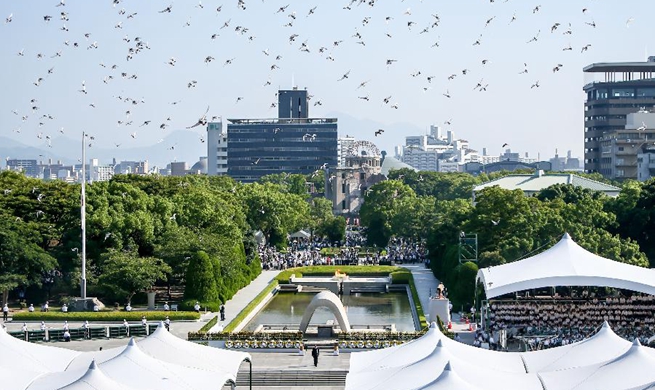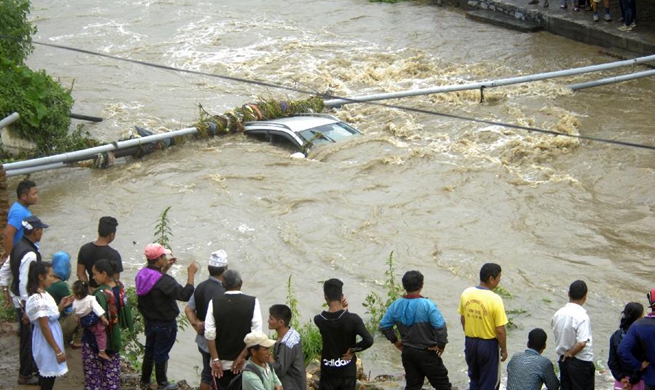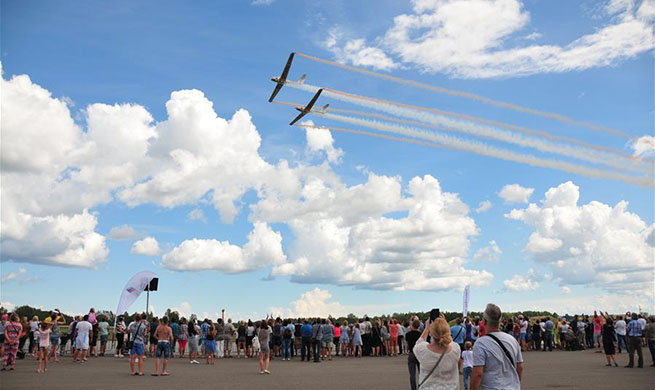TRIPOLI, Aug. 6 (Xinhua) -- Libyan Interior Minister Abdulsalam Ashour on Monday said that all Libya's security problems are caused by violated borders, especially the southern border.
"Southern Libya is suffering and the southern border has become violated," Ashour told Xinhua in an exclusive interview. "Southern Libyan was exploited very badly by criminal gangs of the Chadian and Sudanese oppositions, and other African opposition groups present outside the Libyan border."
"These (groups) have become a reality in southern Libya to carry out criminal acts that undermine the security of Libya," Ashour said, calling on his government to take "urgent and serious" measures to deal with this issue.
The Libyan minister also warned against al-Qaida and the Islamic State, which "have bases in southern Libya and are developing their capabilities, taking advantage of the security vacuum in the region."
Ashour said that the Interior Ministry cannot fight these groups alone, stressing the need for joint efforts to address the issue.
Asked about security situation in the capital Tripoli, Ashour said the situation is "normal," adding that since he took office about four months ago, "we are trying very hard to put things on track."
"Security appears to be very well established in the capital, but sometimes there are some clashes among armed groups inside the capital, causing some tension," he said.
"In the western region, there are some criminal gangs whose have grown recently in the absence of the Interior (ministry), and we are trying now to deter them with full force," he said.
Libya has been suffering from security vacuum and escalating violence since the armed conflict that toppled former leader Gaddafi's regime in 2011.
Ashour explained that the Interior Ministry is currently preparing a training plan for fighters who fought against Gaddafi regime in 2011, to integrate them in the security agencies effectively in coordination with the United Nations.
"After the Feb. 17 Revolution (in 2011) and the integration of the armed groups in the Interior Ministry, we have been trying hard to tame these groups and integrate them into security work through ongoing courses, which is happening currently," he said.
"Instructions to all security directorates come from the Interior Ministry of the Government of National Accord, including promotions, salaries and correspondence," the Libyan official said.
"The salaries, promotions and administrative system are in the capital. The main administration is in Tripoli. There are communications between the departments in the west and east of the country, whether associated with passports, illegal immigration, or civil affairs," said the minister.
Despite signing a UN-sponsored political agreement by the Libyan parties in December 2015, Libya remains politically divided between rival authorities in the east and west of the country, both competing for legitimacy.
"Although all the security institutions and agencies after the February revolution have fallen and collapsed significantly, in recent years they have been recovering and working well," Ashour said.
"We are working on a plan to secure the elections. As soon as the President of the Presidential Council of the Libyan Government of National Accord, Fayez Serraj, announced the elections, we formed the Elections Affairs Office on July 20," he added.
"The office was established to follow up the elections issue," Ashour said, confirming that the office is "working in an excellent manner and continues to communicate with the United Nations and with the National Elections Commission."
The Libyan Interior Minister said that his country was subjected to a "conspiracy" carried out by some Libyans by kidnapping foreigners and destabilizing the capital city, accusing all these criminal acts of "delaying Libya and its development."
"The will of the international community did not coincide. If the vision of the international community on Libya was united, all of its problems would have been solved," he said.













